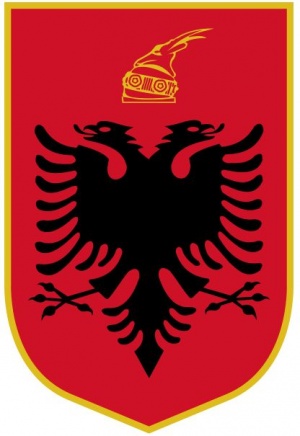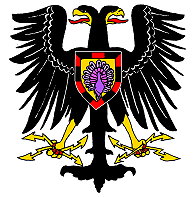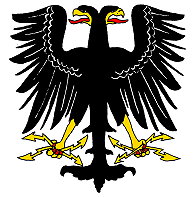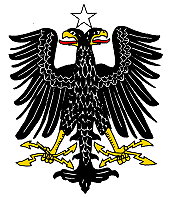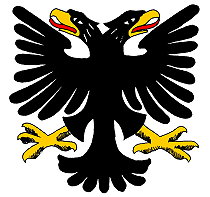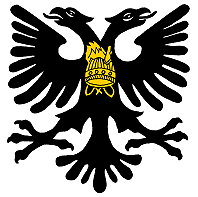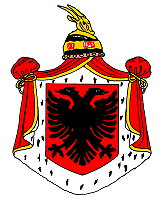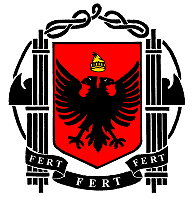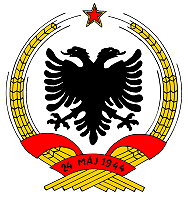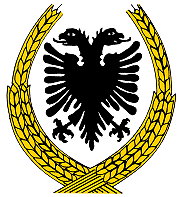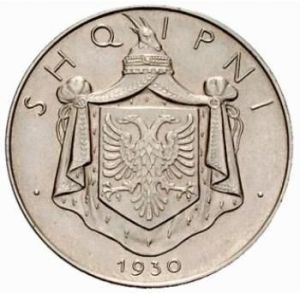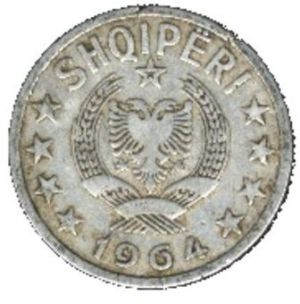National Arms of Albania: Difference between revisions
Knorrepoes (talk | contribs) m (Text replacement - "|Arms of {{PAGENAME}}]]" to "|Coat of arms (crest) of {{PAGENAME}}]]") |
Knorrepoes (talk | contribs) m (Text replacement - "===Official blazon===↵↵===Origin/meaning===" to "{| class="wikitable" |+Official blazon |- |'''English''' | blazon wanted |} ===Origin/meaning===") |
||
| Line 4: | Line 4: | ||
[[File:albania.jpg|center|300 px|National Arms of Albania]] | [[File:albania.jpg|center|300 px|National Arms of Albania]] | ||
= | {| class="wikitable" | ||
|+Official blazon | |||
|- | |||
|'''English''' | |||
| blazon wanted | |||
|} | |||
===Origin/meaning=== | ===Origin/meaning=== | ||
Latest revision as of 14:07, 29 January 2024
| Heraldry of the World |
| Albania heraldry portal |
ALBANIAN NATIONAL ARMS
| English | blazon wanted |
Origin/meaning
The arms were adopted on May 22, 1993.
Albania became independent in 1912 and until 1914 the country only used a double-eagle, without a shield, as State symbol. In 1914 the German Prince Wilhelm zu Wied became King of Albania and added his family arms as a breastshield on the eagle. In addition, he augmented the eagle with four bars of lightning in his claws. The latter represented the Epirus region, which partly became part of Albania (and Greece). Later in 1914 the King fled and the country became a republic. During these days the breastshield was removed again and a bit later a white star was added above the head of the eagle. This symbol remained in use until 1920, when the lightning and star were removed.
The arms from March-April 1914 |
The state symbol from April-September 1914 |
The state symbol from September 1914-1920 |
The state symbol from 1920-1925 |
In 1925 Ahmed Zogu became president and he added a helmet as a symbol for Skanderbeg (the National Hero of Albania) on the breast of the eagle. When he had himself crowned as King in 1928, he introduced new arms in 1929 where the eagle was now placed in a shield, surrounded by Royal mantling and the helmet of Skanderbeg.
The state symbol from 1925-1928 |
The arms from 1929-1939 |
In 1939 Albania was occupied by Italian troops and the arms were changed again. The eagle on the shield remained, but the helmet was now placed on the shield above the eagle. The shield was surrounded by 2 fasces held in place by a knot above the shield (symbol of Savoy, the Italian Royal dynasty). As motto the word 'Fert' was added in triplicate.
The arms from 1939-1943 |
In 1943 Albania was occupied by German troops and the symbol from 1925 (the double eagle, without any further symbols) was re-introdu ced. When the Germans were expelled, the arms from the Italian period were restored and used until 1946, when the People's Republic of Albania was proclaimed.
The new Republic kept the eagle as principal symbol, but now surrounded by wheat-ears and a red star. This symbol remained in use until 1992, when the communist rule ended. From 1992-1993 the star and the banner with the date of the revolution were removed. Since 1993 the black eagle is again placed on the shield and used as National Arms (image above).
The state symbol from 1946-1992 |
The state symbol from 1992-1993 |
The arms on coins:
| 1930 |
1964 |
Contact and Support
Partners:
Your logo here ?
Contact us
© since 1995, Heraldry of the World, Ralf Hartemink 
Index of the site
Literature : Images and information taken from <A href=http://www.christian-siemer.de/wappen/europa/albanien%7Chttp://www.christian-siemer.de/wappen/europa/albanien.htm]]



